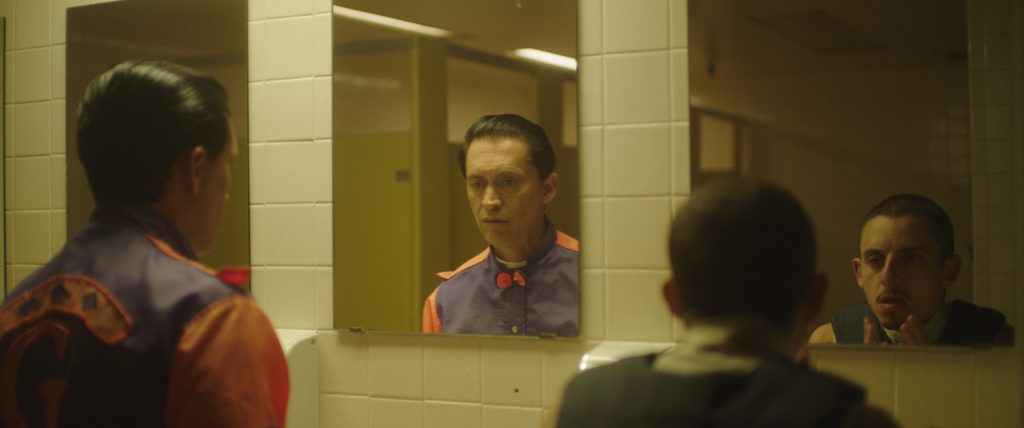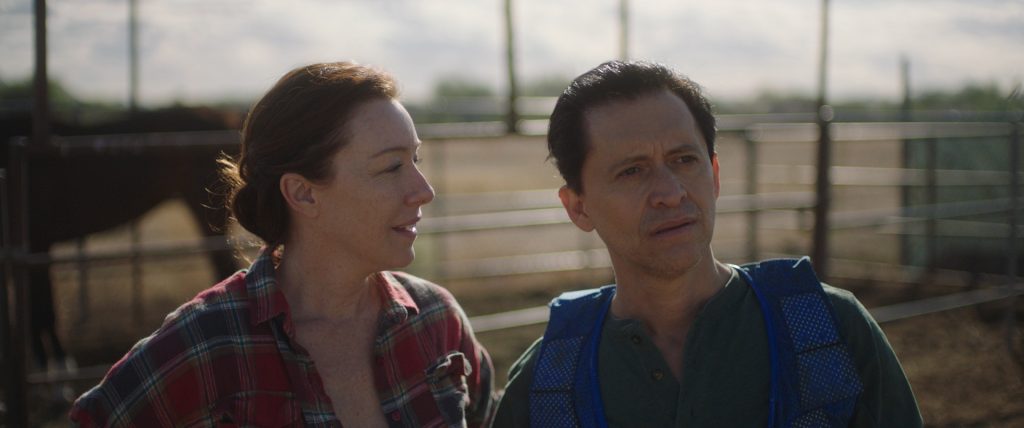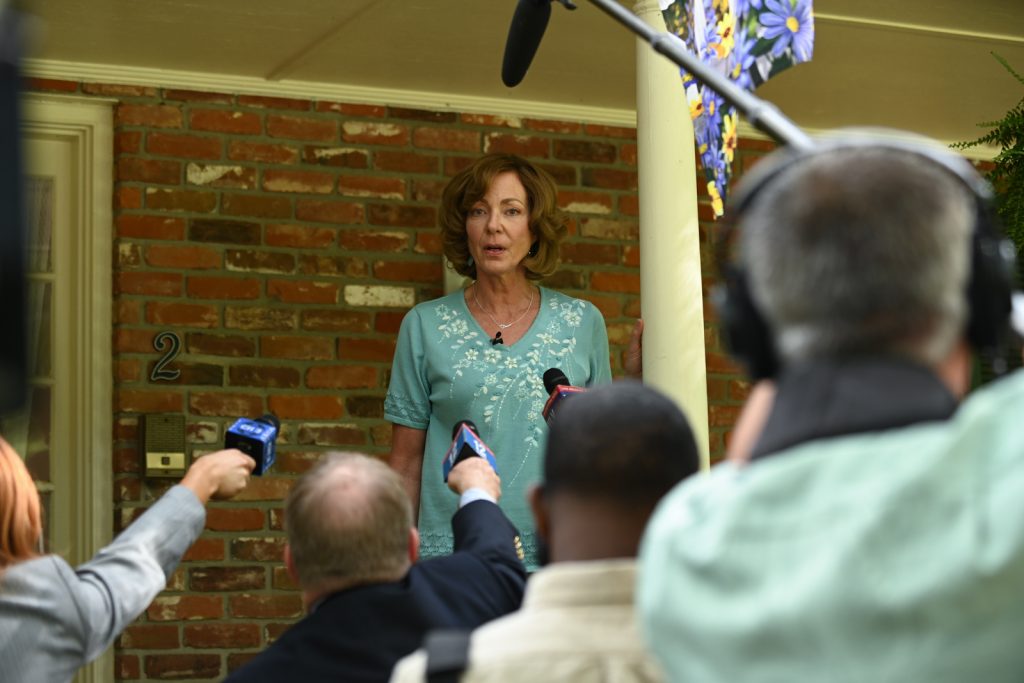March 4, 2022
by Carla Hay
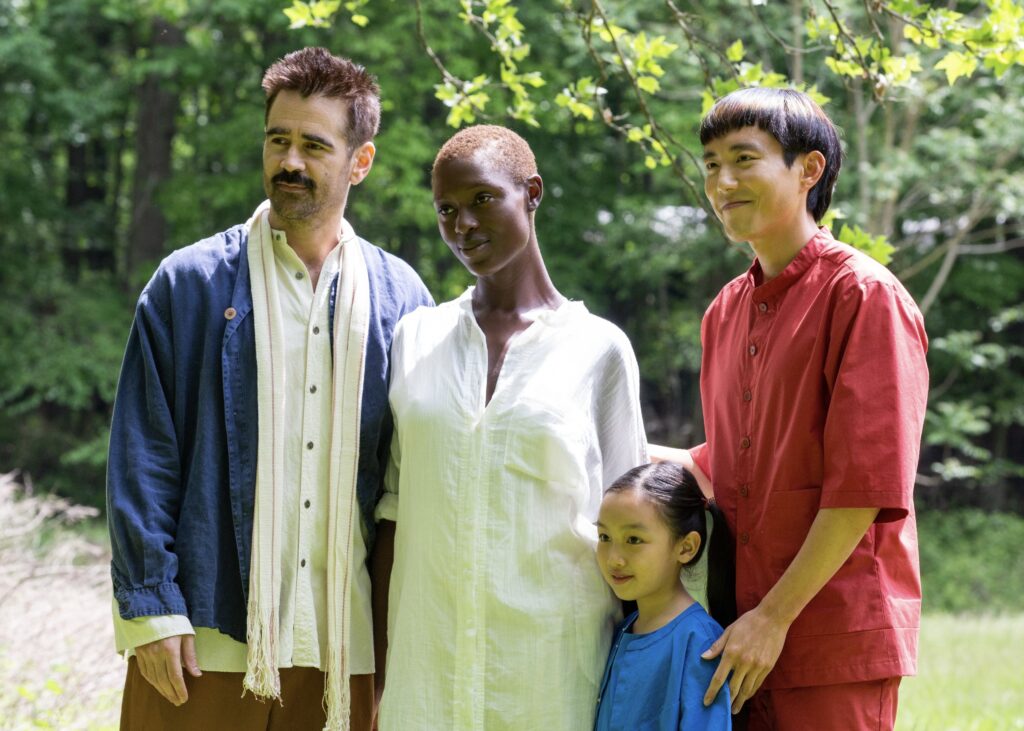
Directed by Kogonada
Culture Representation: Taking place in an unnamed U.S. city, the sci-fi dramatic film “After Yang” has a racially diverse cast of characters (white, black, Latino and Asian) representing the working-class and middle-class.
Culture Clash: After a family’s android malfunctions and appears to be unfixable, the family’s patriarch goes on a quest to find out the origins of this robot.
Culture Audience: “After Yang” will appeal primarily to people who are interested in watching introspective movies about what life could be like in the future.
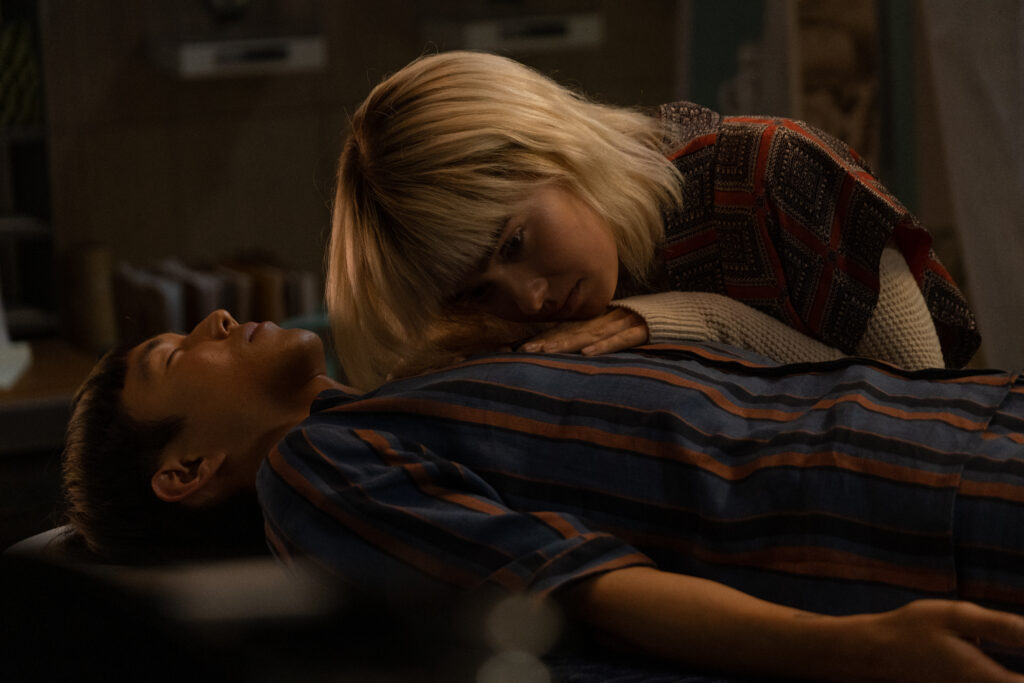
What happens when a family robot breaks down and apparently can’t be fixed? And what if that robot was such an integral part of this family, the family might be broken too if the robot can no longer be in their lives? Those are the questions posed in the thoughtful sci-fi drama “After Yang,” written and directed by Kogonada. The movie might be too slow-paced for some viewers, but it’s worth viewing for a contemplative story about how the need for emotional connections won’t change, no matter how much technology advances.
“After Yang” opens with a “selfie” family portrait in the home backyard of the Fleming family: Jake (played by Colin Farrell), Jake’s wife Kyra (played by Jodie Turner-Smith), their daughter Mika (played by Malea Emma Tjandrawidjaja) and their human-looking android Yang (played by Justin H. Min), who operates the camera before getting into the group photo. It seems like a happy family gathering, based on the smiles in the photo, but Jake and Kyra have grown emotionally distant from each other in their marriage.
Mika, who’s about 6 or 7 years old, seems oblivious to the tension in her parents’ relationship. Jake and Kyra adopted Mika as a baby from China. Yang is described as a “techno-sapien.” He was purchased to be a companion to Mika and so he could teach her about Chinese history and culture. Yang, who has a kind and patient personality, has known Mika since she was a baby. Yang is treated like a nanny and a family member.
“After Yang” takes place in an unnamed U.S. city in an unspecified future, when human-looking androids and human clones are fairly common. (“After Yang” was filmed primarily in New York state’s Rockland County.) All of the actors in “After Yang” keep their native accents, so the movie has a very cosmopolitan tone to it. Most of the cast members are American, but Farrell is Irish, Turner-Smith is British, and there are some other non-Americans who are in the cast.
Jake owns a tea shop, while Kyra works at an office job in an unnamed industry. The passion seems to have left their marriage, but Jake and Kyra are not on the verge of splitting up. These two spouses don’t have big arguments, but they just seem to barely tolerate each other.
Through various conversations between Jake and Kyra, viewers find out that her main complaint about him is that she doesn’t think he spends enough time with the family. Kyra tells Jake during one of their tension-filled conversations: “I just want us to be a team, a family.” An early scene in the movie shows Mika and Kyra at home eating dinner. Mika asks where Jake is, and Kyra tells her that he has to work late. However, Kyra puts a positive spin on Jake’s absence by saying that Jake being busy with customers means that his business is doing well.
Jake obliges Kyra’s request to spend more time with family, by participating with Kyra, Mika and Yang in a worldwide virtual dance-off competition that happens once a month. The dance-offs are based on the number of people in each group. For example, groups of four compete against each other, groups of three compete against each other, etc. Because this is a virtual competition, thousands of people can compete at the same time.
In this dance-off, groups go online and dance to the same song and are monitored by judges. The objective is for everyone in the group to dance in sync. Any group that has a member who dances out of sync is eliminated.
The movie’s opening credits play over a memorable montage sequence of the Fleming family and other four-member groups dancing in this contest. Some of the people in the other groups end up being supporting characters in this movie. Despite the Fleming family’s best efforts, someone in their group dances out of sync (Jake gets the blame), and they’re eliminated, but they seemed to have fun bonding over this shared activity.
Not long after the family participated in this dance-off, Yang malfunctions and shuts down. Because his exterior is made of human-like flesh, there’s a limited time to fix him before he will start decomposing. Jake and Kyra have different reactions to Yang’s shutdown. Jake wants to do everything he can to save Yang, because he knows how emotionally attached Mika is to Yang. Kyra is more reluctant to fix Yang, because of the expenses involved and because she thinks that Mika needs to learn about death.
Kyra also gripes to Jake that he should’ve bought Yang as a new android from a company called Brothers and Sisters, which is the main company that has the authority to sell new androids. Instead, Yang was purchased as a used android from a company called Second Siblings, a company that’s considered to be inferior to Brothers and Sisters. The place where Yang was purchased affects the ability to repair him quickly, because Yang’s warranty is with Second Siblings, not with Brothers and Sisters.
The Fleming family has a next-door neighbor named George (played by Clifton Collins Jr.), whom Jake thinks is a little weird and annoying. George notices that Jake is carrying Yang, so Jake tells George that Yang malfunctioned the night before. George mentions to Jake that he has a friend named Russ who does android repairs for a reasonable price. George advises Jake on what to do about Yang: “I wouldn’t take him back to Brothers and Sisters. They’re just going to try to get you to recycle him for a new model.”
When Jake goes to the place where he remembers Second Siblings was located, he’s dismayed to find out that the business has closed, and a fish aquarium store is now in its place. Mika is with him on this trip and is afraid of what will happen to Yang. To placate Mika’s worries, Jake buys her a pet fish from the shop.
Jake then goes to a repair shop called Quick Fix, where a repair consultant named Aaron (played by Brett Dier) tells Jake that he has two options: (1) recycle Yang and get a $1,000 discount toward a new android, or (2) turn Yang’s head and voice box into a virtual assistant, and the family can keep the rest of Yang’s salvaged parts. Jake decides to take neither option.
With Mika growing increasingly anxious about losing Yang, Jake decides to go to George’s friend Russ (played by Ritchie Coster) as a last resort. Russ tells Jake that he needs Jake’s permission to open Yang’s interior core. Opening this interior core is is an illegal thing to do, but Russ insists it’s the only way to figure out how Yang can be fixed. Yang is left at Russ’ repair shop for the time being.
Back at home, Jake and Kyra continue to disagree over what to do about Yang. Kyra also tells Jake: “Yang has been wonderful, and we’d miss him terribly, but we’ve been over-reliant on him. We bought Yang to connect [Mika] to her Chinese heritage, not to raise her.” Jake replies, “Yeah, but we spent a lot of money on Yang.”
Kyra says, “If we can’t fix Yang, we’re not going to buy another sibling for Mika. We can’t afford it anyway.” Kyra also says that she and Jake, not an android, should be responsible for teaching Mika about her Chinese heritage. Jake remains undeterred. His determination to save Yang leads him down unexpected paths and eventually on a quest to find out Yang’s origins.
Along the way, some other people play important roles in this story, including a Museum of Technology curator named Cleo (played by Sarita Choudhury) and a young female clone named Ada (played by Haley Lu Richardson), who has a connection to Yang. It’s enough to say that through a series of circumstances, Jake can access Yang’s memories by putting on special sunglasses. What Jake finds out changes his outlook on many things in life.
“After Yang” takes its time in unpeeling some of the layers in this story. There are several scenes of people staring off into space, as if they’re in deep thought. And although Jake is seen occasionally at work, he doesn’t seem to have any employees at his tea shop. It will make viewers wonder who’s operating Jake’s tea shop while he’s going around investigating the mystery of Yang, while Mika is sometimes along for the ride.
One of the biggest flaws in the movie is how Kyra is such an underdeveloped character. It will be hard for a lot of viewers to emotionally connect to Kyra, who comes across as cold and completely boring. Yang might be a robot, but he has more personality than Kyra does. And for all of Kyra’s complaining about Jake not spending enough time with the family, Jake is the one who ends up spending more time with Mika than Kyra does during the course of this story.
Only when Jake accesses Yang’s memories do viewers get to see a brief glimpse of Jake and Kyra in happier times, when they look like a real married couple. But for the vast majority of “After Yang,” there’s little to no chemistry between Farrell and Turner-Smith as these spouses. Even though they are portraying a married couple drifting apart, there’s nothing in the movie that shows why Jake and Kyra fell in love with each other in the first place.
“After Yang” also could have used more of the story to explore family issues when an adopted child is of a race that’s different from the adoptive parents. The only reference to any realistic challenges of interracial adoptions is a flashback scene where Mika confides in Yang about how some kids at her school told her that Jake and Kyra are not her real parents and asking him what it means to be Asian. Mika knows that she’s adopted, but she still seems a little hurt and confused over people thinking that Jake and Kyra aren’t her “real parents.” Yang then tells Mika about tree grafting as an analogy to adoption. It’s a very trite and simplistic way to deal with this issue.
Later in the movie, Kyra calls Jake while she’s at her job to ask Jake to pick up Mika from school because Mika got into a physical fight with another student. Mika was sent to the school principal’s office over this altercation, but the movie never shows Jake and/or Kyra interacting with anyone at the school about this problem or talking to Mika about it. It would be easy to assume that Mika might have gotten into the fight because of the adoption issue, but the movie never explains how Jake, Krya and Mika tried to resolve this problem.
Tjandrawidjaja is very good in the role of Mika, but her character was basically written to be just a cute and somewhat precocious kid. Instead, “After Yang” puts most of the emphasis on Jake as the person whose thoughts and feelings have the most importance in the story, since he’s the one who’s the most involved with and affected by finding out Yang’s origins. Farrell handles the character of Jake with a lot of care, but some viewers might grow tired of so many people in the movie having pained expressions on their faces without much action happening in the story.
The rest of the supporting cast members are perfectly fine in their roles. Min and Richardson do the best that they can with their Yang and Ada characters in the limited screen time that these characters have. When viewers see the connection between Yang and Ada, it will make a lot of people wish that there could’ve been an entire movie centered on Yang and Ada.
Kogonada brings a futuristic, dream-like style to the flashback sequences of Yang’s memories. These striking visuals are among the best aspects of “After Yang.” If viewers have the patience to watch this movie, the last third is the best and most meaningful part of the film. “After Yang” isn’t a groundbreaking sci-fi movie, but it offers a unique perspective of humanity when human clones and androids that look like humans co-exist with people.
A24 released “After Yang” in select U.S. cinemas on March 4, 2022, the same date that the move premiered on Showtime.

